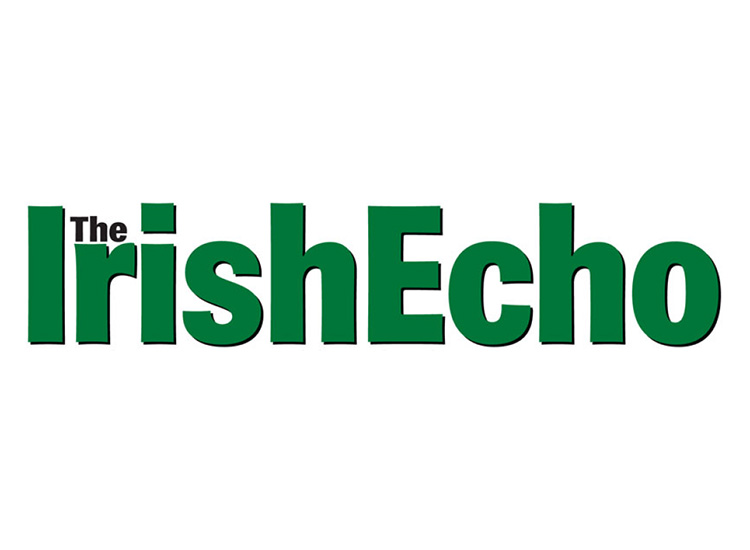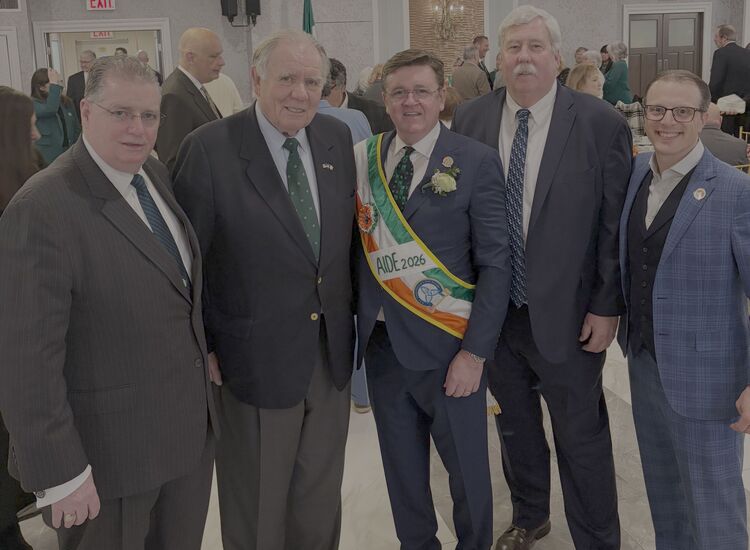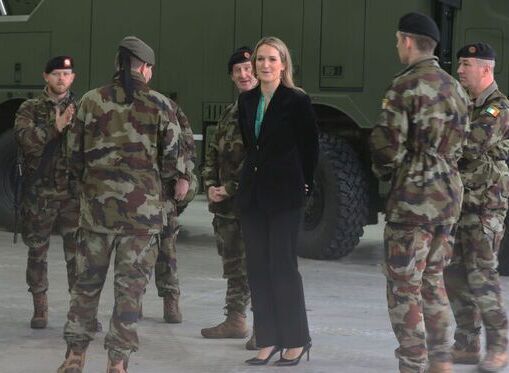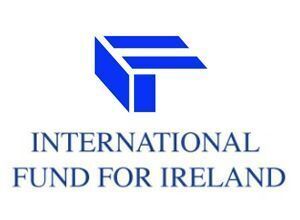President John F. Kennedy met with Robert Briscoe, Lord Mayor of Dublin, and Ambassador to the United States from Ireland Thomas J. Kiernan, on Oval Office, White House, on March 26, 1963. ABBIE ROWE, WHITE HOUSE PHOTOGRAPHS, JOHN F. KENNEDY PRESIDENTIAL LIBRARY AND MUSEUM
By Geoffrey Cobb
On Saturday, March 16, 1957, the Lord Mayor of Dublin joined New York City’s Mayor Wagner on the reviewing stand as they watched the St. Patrick’s Day parade where bagpipers on Fifth Avenue played Irish melodies and marchers carried thousands of American and Irish flags. The scene was no different than any other year, except for one difference: this year the Lord Mayor of Dublin, Robert Briscoe, was a Jewish Dubliner creating excitement in both the Irish and Jewish communities across the United States. Briscoe also possessed quintessentially Irish traits; he was jovial, gregarious and witty. In the middle of the parade, he turned to Wagner and jested that his dual identity might win him many votes if he ever ran for Mayor of New York.
The previous June, Briscoe’s name appeared in headlines around the world when newspapers announced the shocking news that the overwhelmingly Catholic city of Dublin had just elected a Jewish lord mayor of Dublin. Briscoe presented an unusual combination: a former IRA gun runner and observant Orthodox Jew. Briscoe toured America and Americans quickly fell in love with him. American TV could not get enough of Briscoe. He appeared twice as a guest on the TV game show “What’s My Line?” and CBS even aired a biopic “The Fabulous Irishman” starring Art Carney as Briscoe.
Briscoe’s tour proved such a resounding success that he reportedly raised tens of millions of dollars. New York’s Irish tourist office reported that travel requests had jumped 20 percent over the previous month. Although Briscoe was not an American, the fact that even in a Catholic country like Ireland, there was no conflict between his Judaism and his loyal patriotism and love of country, impressed Americans and helped them imagine Jews as loyal Americans too. Robert Briscoe’s father, a Lithuanian Jew, had come to Ireland in the 1880s fleeing the bloody pogroms there and soon a tiny Jewish community sprung up in Dublin. His father, identifying with the growing nationalism and Gaelic revival, initially worked as a peddler but soon became a prosperous businessman. In 1894, he had a son whom he named Robert Emmet Briscoe in honor of the 18th century Irish martyr Robert Emmet. In 1914, his father sent young Robert to Berlin to study electrical engineering. When war broke out, Briscoe was interned as an enemy alien; but was later released. On his return to Ireland his father, concerned that his son could be conscripted into the British military, sent him to New York. A legend claims that on the voyage he fell in love with Nora Connolly, daughter of James Connolly who asked him to hold a sealed envelope. After clearing immigration Nora was met by labor leader James Larkin, who asked Bob for the envelope. Only then, Briscoe realized that he had smuggled in the letter, the first act in Briscoe’s long career as an Irish courier. He later learned the papers he had carried into America were dispatches from James Connolly to German Ambassador Count von Bernstorff. They were the beginning of what was known as the "German Plot."
Briscoe opened a New York factory manufacturing Christmas lights, but closely followed events at home in Ireland and attended meetings of the underground Clan na Gael group of Irish patriots. He sold his factory and was recruited into the IRA by Liam Mellows who asked him to return to Ireland. Because he had not been involved in the 1916 uprising and he was Jewish, British authorities did not suspect his IRA membership. In Dublin, he operated under the pseudonym Captain Swift establishing a clothing business as a front to smuggle guns. Michael Collins appointed Briscoe to his personal staff and sent him to post-war Germany where he duped the British authorities and smuggled a huge cache of weapons into Ireland. From 1917 to 1921, he worked with both Collins and Éamon De Valera in Europe and in America. As an anti-Treaty Sinn Féiner during the Irish Civil War, Briscoe even sensationally helped seize the Irish Consulate in New York for a short time.
After Ireland gained its independence, together with his close friend De Valera, he helped found the Fianna Fáil party and was elected to the inaugural Dáil Eireann, in 1927 as the first Jewish member of the Dáil, and he was continually re-elected until his retirement in 1965, but not without incident. In December 1927 an unmarked car pulled alongside his vehicle and fired several shots in an assassination attempt.
Though he was committed to Ireland, he never forgot his Jewish heritage and Briscoe quickly recognized the danger of Nazism to his people and the gathering storm clouds over Europe. He drew upon his former New York Irish American contacts to raise funds to help Jews escaping fascism. He worked frantically to rescue European Jews from the Nazis, crossing Europe and America warning of the impending holocaust. He was unfamiliar with Zionism, but was drawn to the Revisionist Zionist leader Vladimir Jabotinsky, who sent him on missions to America, Poland and South Africa, where he raised money used to purchase ships to bring East European Jews to Palestine.
Sadly, Briscoe failed in his efforts to get Jewish refugees into Ireland, blocked by clerics, politicians, civil servants and Ireland’s neutrality. He argued heatedly with Irish trade envoy to Germany Charles Bewley, who tried to block his effort of helping Jewish refugees gaining visas for Ireland during the war. During World War II, he tried to get a rescue ship for Hungarian Jews sailing under Irish Colors, but could not obtain the necessary government permission. He also failed to obtain visas for many German Jews including his Aunt Hedwig and her daughter. Hedwig died in Auschwitz, along with 150 other members of Briscoe’s extended family and his failure to save them weighed heavily on him until his death. After World War II he secretly advised and armed the Zionist Irgun group who fought the British in Palestine and Briscoe acted as a special advisor to Menachem Begin in the transformation of Irgun from a paramilitary group to a parliamentary political movement which later became the ruling Likud Party.
Briscoe, who was chosen as Lord Mayor of Dublin in 1956 and again in 1961, called his election a "magnificent gesture that justified confidence in the 'absolute tolerance' of the Irish capital." Briscoe also stated his election "proves that in Catholic Ireland a man of any faith has the good will of his fellow citizens if he deserve it and is prepared to give them service."
His 1957 visit was extensively covered by American newspapers, especially in Boston, where Catholic newspapers and the Boston Jewish Advocate reported extensively on its progress. Boston’s Christian Scientist Monitor paper reported on Briscoe’s "helping his fellow religionists, the Boston Jewish community" with a fundraising rally for the Jewish Appeal's 100-million-dollar emergency fund. The Monitor also noted the unusually enthusiastic reception Briscoe received from Bostonians, quoting Boston police Superintendent James F. Dale, who estimated that approximately 450,000 persons lined the parade route, "the biggest turnout I've even seen in Southie," and Mayor Hynes's comment that "it's the most enthusiastic parade I've ever witnessed. There has been one continuous burst of enthusiasm. This is the warmest reception ever given any visitor to Boston." During and immediately following his visit, the New York Times ran over 35 articles about Briscoe, and The Washington Post even serialized his autobiography.
His trip to America included three visits to Chicago and on his final visit to the Windy City he was warmly greeted by Mayor Daley. Papers reported that Briscoe declared his mission to the United States accomplished, stating, “I came here to spread good will between Ireland and America, and to do what I could to help further assistance to Jewish refugees and Israel. Now I'm ready to go home and give the body a rest.” His popular memoir, “For the Life of Me,” was published in 1958 on the heels of his American journey
Robert’s son Ben was elected to Dáil Eireann as a Fianna Fáil TD in 1965 succeeding his father who had served a TD for 38 years. Together they became the longest serving family in the Irish Dail. Robert died in 1969 aged 74. Like his father, the Dublin City Council also chose Ben as Lord Mayor, which he described as "one of the proudest moments of my life.” The New York Emerald Isle Immigration Center has created the Robert Briscoe award, which honors Jewish New Yorkers who have helped support immigration in the United States.









